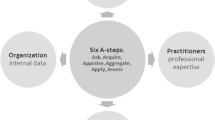Abstract
What does it mean to manage effectively? This paper discusses the historical problem of the criterion, stemming from skeptical thinkers, and applies it in a management environment. The aim is to highlight how awareness of criteria in judging outcomes may yield richer and more nuanced views of effectiveness. The argument begins by exploring the characterization of management actions and discusses how a distinguishing quality of those actions is that they’re oriented towards outcomes. The question is then how to assess outcomes associated with effective management. The problem of the criterion, which identifies the multiple criteria used in judgments, is introduced and discussed in connection with outcomes. A guiding question is, What are the criteria used to assess whether outcomes are associated with effective management? A central point in the discussion is that the assessment of outcomes in effective management is contingent upon the criteria that are applied. These criteria function as part of a contextual and complex network. Thus what are seemingly simple and obvious answers may be seen in a different and more nuanced manner once various criteria are identified. The management vision that emerges is one in which management is more layered than simply ‘achieving results.‘ For although results do matter, the network of criteria used to assess outcomes may present those outcomes in new and different lights. Management is seen as the art of recognizing varied possibilities based on the criteria used to assess outcomes.
Similar content being viewed by others
References
Amico, Robert. 1993. The problem of the criterion. Lanham: Rowman and Littlefield.
Aristotle. 1941. The basic works of Aristotle. New York: Random House.
Augustine. 1995. Against the academics. Indianapolis: Hackett Publishing Company.
Burns, Robert and Hugh Rayment Pickard. 2000. Philosophies of history: from Enlightenment to Postmodernity. Oxford: Blackwell Publishers.
Caroselli, Marlene. 2000. Leadership skills for managers. New York: McGraw-Hill.
Chisholm, Roderick. 2013. The problem of the criterion. Milwaukee: Marquette University Press.
Cicero. 2006. On academic skepticism. Indianapolis: Hackett Publishing Company.
Collingwood, R. G. 1994. The idea of history. Oxford: Oxford University Press.
Cummings, Stephen, Todd Bridgman, John Hassard, and Michael Rowlinson. 2017. A new history of management. New York: Cambridge University Press.
Davidson, Donald. 1980. Essays on actions and events. New York: Oxford University Press.
Drucker, Peter. 1993. The practice of management. New York: HarperBusiness.
Goodman, Nelson. 1978. Ways of worldmaking. Indianapolis: Hackett Publishing Company.
Grove, Andrew. 1983. High output management. New York: Vintage Books.
Kahneman, Daniel, Olivier Sibony, and Cass Sunstein. 2021. Noise: a flaw in human judgment. New York: Little, Brown Spark.
Kuhn, Thomas. 1970. The structure of scientific revolutions. Chicago: University of Chicago Press.
Mead, George H. 2002. The philosophy of the present. New York: Prometheus Books.
Montaigne, Michel de. 2003. Apology for Raymond Sebond. Indianapolis: Hackett Publishing Company.
Moya, Carlos. 1990. The philosophy of action: an introduction. Cambridge: Polity Press.
Popkin, Richard. 2003. The history of skepticism: from Savonarola to Bayle. New York: Oxford University Press.
Popkin, Richard, and Maia Neto José. 2007. Skepticism: an anthology. Lanham: Prometheus Books.
Richards, Chet. 2004. Certain to win: the strategy of John Boyd applied to business. Middletown: Xlibris.
Saloner, Garth, Andrea Shepard, and Joel Podolny. 2001. Strategic management. New York: John Wiley.
Seiden, Joshua. 2019. Outcomes over output: why customer behavior is the key metric to business success. Middletown: Sense and Respond Press.
Sextus Empiricus. 1990. Outlines of pyrrhonism. New York: Prometheus Books.
Spivey, Nigel. 2016. The classical world: the foundations of the west and enduring legacy of antiquity. New York: Pegasus Books.
Taylor, Frederick W. 1911. The principles of scientific management. New York: Harper & Brothers.
von Bertalanffy, Ludwig. 1969. General system theory: foundations, development, applications. New York: George Braziller.
Wittgenstein, Ludwig. 1972. On certainty. New York: Harper & Row Publishers.
Wittgenstein, Ludwig. 1958. Philosophical investigations. Oxford: Blackwell Publishers.
Author information
Authors and Affiliations
Corresponding author
Additional information
Publisher’s Note
Springer Nature remains neutral with regard to jurisdictional claims in published maps and institutional affiliations.
DISCLAIMER: The views expressed herein are those of the author and do not represent the views of the Federal Judicial Center or its Board.
Rights and permissions
About this article
Cite this article
Idler, J.E. Effective Management and Skepticism: Exploring Criteria in Judging Outcomes. Philosophy of Management 22, 275–291 (2023). https://doi.org/10.1007/s40926-022-00226-z
Received:
Accepted:
Published:
Issue Date:
DOI: https://doi.org/10.1007/s40926-022-00226-z




